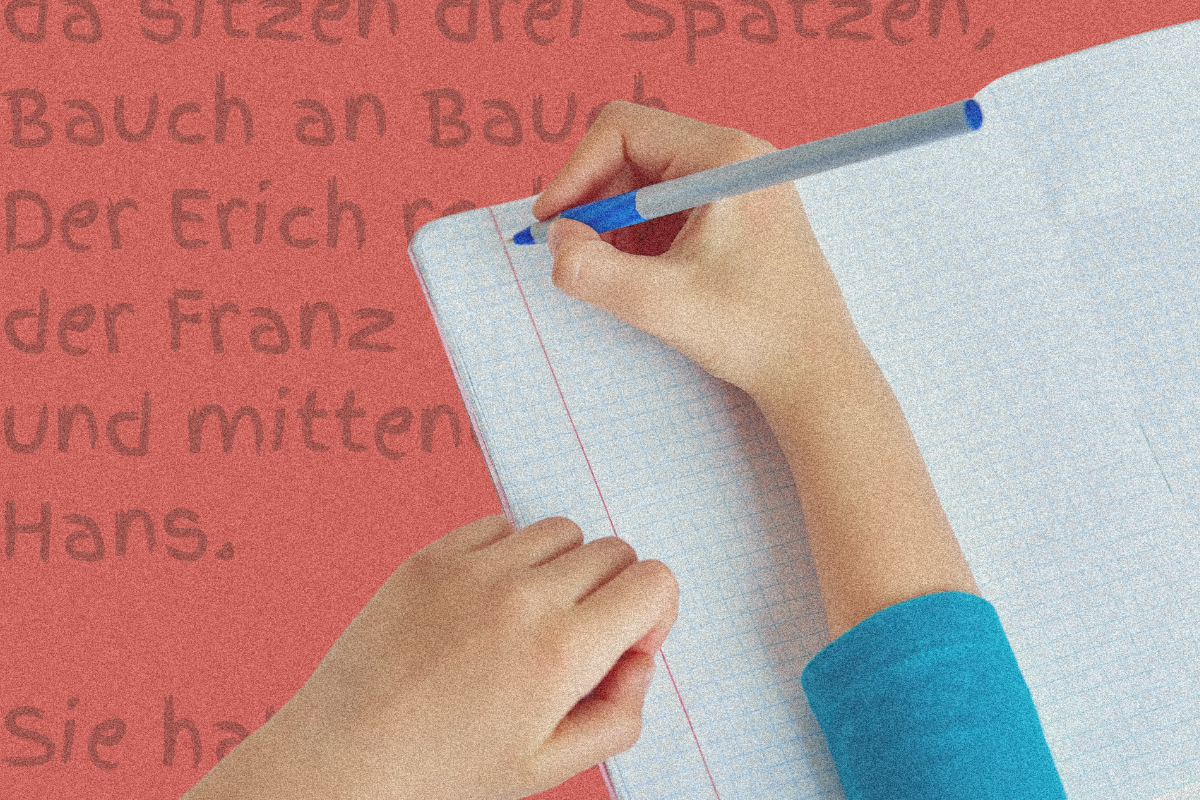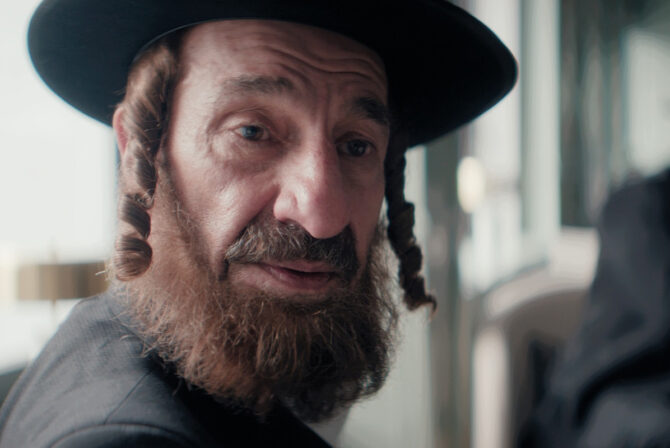About two weeks into our sabbatical in Germany, my eldest pulled his yellow homework folder from his schoolbag and proudly showed me a handout written in Frau Boller’s meticulous teacher’s script. He studied the page and began reciting “Die Drei Spatzen” (“The Three Sparrows”), a poem by Christian Morgenstern — half reading, half reciting by heart — impressive for a Canadian kid who had been in German school for just a few days.
I listened, startled, not by his speed in picking it up, which is the magic of childhood, but by how much joy he displayed. The language, light and fresh in his mouth, carried none of the weight it has always held for me.
My relationship with German is tangled, a knot of personal history, linguistic barriers and the echoes of my family’s past. It’s the language of my Jewish grandparents, who fled Nazi Germany for British Mandate Palestine; the language that filled their Haifa living room when aunties and friends gathered for their regular Kaffeeklatsch; and the language that once silenced my grandmother, who clammed up when a German woman abroad recognized her accent and spoke to her in what she thought was their shared tongue.
For a long time, German was an inheritance I couldn’t quite grasp. It cast a long shadow.
Understanding came later, through undergraduate courses, summer intensives and eight years of Ph.D. research in German-Jewish literature. German isn’t entirely mine, but I’ve made it my own — or perhaps it has claimed me.
I had already spent a decade immersed in German when I met my German husband. I loved it. Not with bodice-ripping passion, but with the steady affection of an enduring alliance, the kind people in arranged marriages describe. My academic marriage set the stage, in a way, for my actual marriage. Yet there’s a difference between loving a language and loving in it. When, on our first date, my husband casually shifted the conversation from English to German, I had no idea we were on our way to forging a multilingual future together.
Our first child’s arrival marked the beginning of our multilingual journey at home. My husband spoke to him exclusively in German, I did the same with Hebrew, and English was the language we spoke to each other. At first, our efforts were met with moderate success. Our son was slow to speak but understood everything we said. When he finally started forming full sentences, they tumbled out in a jumble that made him sound like he’d just stepped off the boat from the Old Country. Still, we felt confident about the multilingual experiment.
When his little brother arrived during the pandemic, however, our resolve faltered. The two boys started speaking to each other primarily in English, and Hebrew, once a firm presence, began to fade. Since our arrival in Germany, my younger son bristles every time I speak Hebrew. “No, Ima, say it in Deutsch!” He breathlessly counts to zwanzig (twenty) and shouts, Warte! (Wait!) if I’m ahead of him on the sidewalk. The language is a game to him, which might explain why he gleefully shouts, Kartoffelbrei! (mashed potatoes), as he cannonballs into the swimming pool. Wanting to encourage him, I find myself slipping into German more often than Hebrew. When I catch myself, guilt creeps in. I wonder if I’m letting go of the part of my heritage I swore to preserve. But then again, isn’t his excitement about German something to celebrate?
As joyful as their language play can be, it is not without its challenges. My younger son’s immersion in German has come at the cost of his Hebrew, while my older son expresses frustration with the limits of his fluency. When I speak to him in Hebrew, he cries, “I can only say ken and lo!” Though German now comes more easily, the frustration still surfaces when words escape him. Yet it’s not only frustration — it’s a deep longing to feel at ease in all three languages, as though he’s taken for granted that all three are part of him.
A few months ago, he started second grade in Freiburg, a picturesque university town nestled in the Black Forest. He has adapted surprisingly quickly. Every day, he asks my husband to translate a new slang word he’s picked up. My younger son is absorbing German in quieter ways. When he leaves kindergarten, his teacher crouches down and says: Bis morgen. Ich freue mich auf dich. (Until tomorrow. I look forward to seeing you.) Never has a language sounded so gentle.
Moments like these cause something in me to shift. German softens, regaining its innocence, as though my children reshape it even as it imprints upon them.
Still, the language barrier can feel unrelenting. It’s strange to see my children immersed in a language tied to historical terror and tragedy. I hear parents call out Achtung! on the playground and instinctively flinch. And when German words come out of my own mouth, I squirm for a different reason, uncertain whether I’ve gendered a noun correctly (leave it to German to have three genders) or whether my attempt at sounding idiomatic only makes me sound more foreign.
When I speak German, I do so with a mix of love and unease, my words shaped as much by self-consciousness as by echoes of the past. But my children speak with joy, without hesitation, without the weight of history. Whenever my eldest says the word ich (I), the soft ch sounds a little more like the Yiddish equivalent, as if he’s loosening phlegm. I bristle, wondering how it sounds to native speakers. But then, I stop myself and marvel at the beauty of his accent — dos pintele yid (the little Jewish spark) — stamped upon a foreign yet familiar tongue.
The result of our messy trilingual experiment, I often joke, is that none of us can speak any language properly. But what does it even mean to speak “properly”? How can I give my children a capacious, multilingual worldview if I continue to judge their expression by narrow, monolingual standards?
Many twentieth-century Jewish writers I’ve studied felt at home in more than one language precisely because they were never quite at home in any one country or culture. The Slovakian-Israeli poet Tuvia Rübner, who arrived as an orphan in Israel in 1941, spent his life suspended between German and Hebrew. His bilingual poetry stands as a testament to that liminality. For him, mastery of either language was never the goal; instead, the aim was to discover a more nuanced reality in the space between them. As he once asked, Why must one master language? Why can’t one simply befriend it?
This is precisely what children do with language: they play with it. I once believed that mastery was the goal — raising children who could switch effortlessly between languages, their grammar flawless, their vocabulary expansive. But now, I wonder if something deeper is at stake: not mastery, but a lifelong friendship with language.
My children grasp this intuitively. They make mistakes, mispronounce, mix. None of this matters. Imprecise, innocent and unburdened, their language is as free as they are simply to become.








